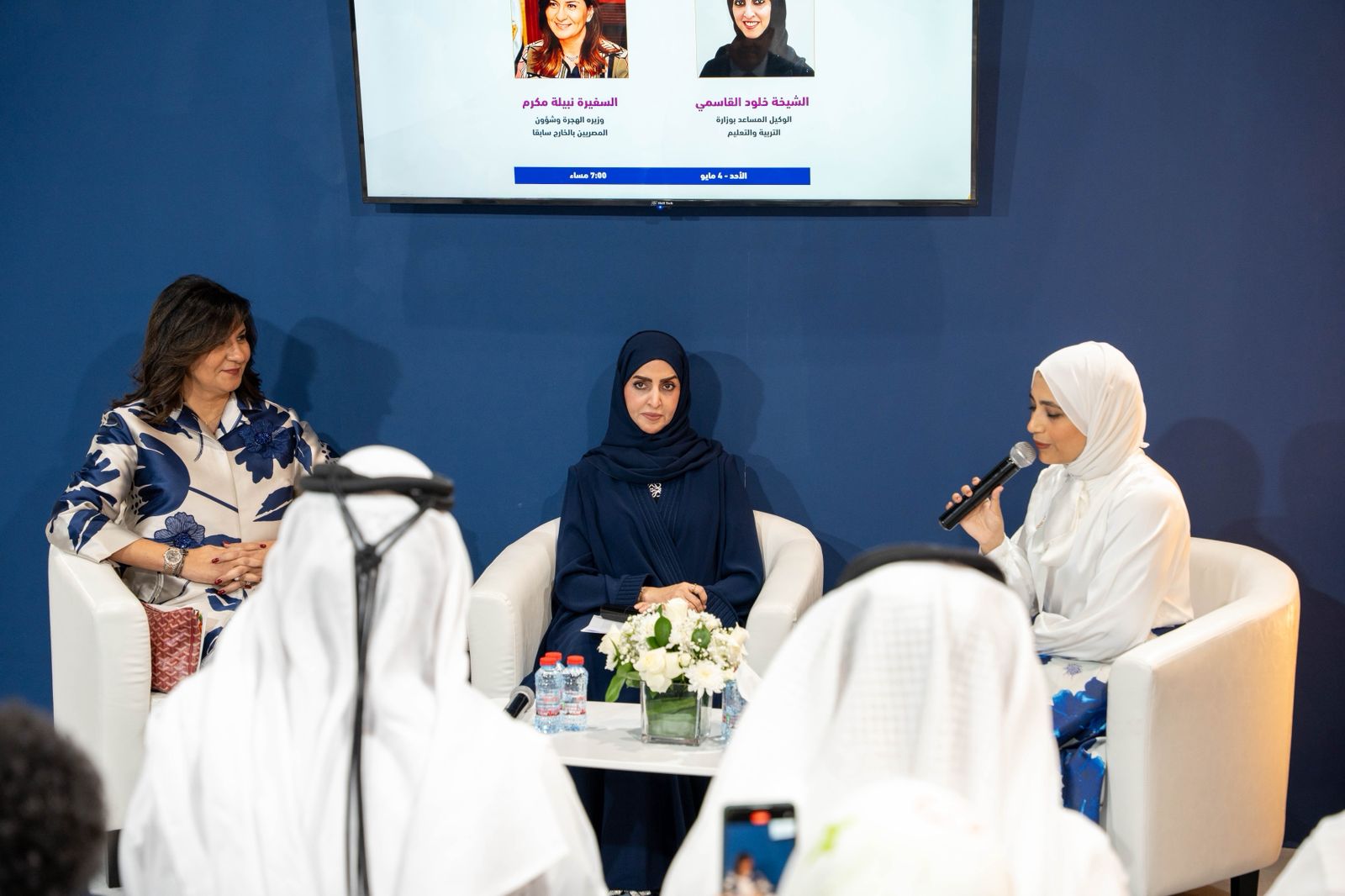“Women and the Building of a Generation Capable of Spreading the Values of Coexistence and Peace” — Seminar Hosted by Muslim Council of Elders’ Pavilion at the Abu Dhabi International Book Fair
Her Excellency Sheikha Khulood Al Qassimi, Assistant Undersecretary at the Ministry of Education in the UAE: “The Muslim Council of Elders has prioritized the inclusion of women in its global programs, driven by the belief that building bridges of dialogue begins within the family.”
Ambassador Nabila Makram, Former Minister of Immigration and Egyptian Expatriates: “Women are peacemakers, value-bearers, and bridges for the transmission of cultural traditions.”
As part of its cultural and intellectual program at the 34th Abu Dhabi International Book Fair, the Muslim Council of Elders’ pavilion hosted a seminar titled “Women and the Building of a Generation Capable of Spreading the Values of Coexistence and Peace.” The session featured Her Excellency Sheikha Khulood Al Qassimi, Assistant Undersecretary at the Ministry of Education in the UAE, and Her Excellency Ambassador Nabila Makram, Former Minister of Immigration and Egyptian Expatriates. The event was attended by a distinguished group of intellectuals, researchers, and book fair visitors.
Opening the seminar, Sheikha Khulood Al Qassimi emphasized that women play a foundational—not merely complementary—role in society. She described women as vital agents in instilling noble human values and nurturing generations capable of leading the future. She noted that the moral and intellectual challenges facing societies today require viewing tolerance and acceptance not just as ideals, but as existential necessities. Highlighting the pivotal role of mothers, she stressed that dialogue begins in the home, where wise women cultivate empathy, compassion, and openness in their children. Women, she noted, are the first institutions of dialogue—especially through the role of mothers in teaching active listening and respect for differing viewpoints.
Sheikha Khulood Al Qassimi also praised the outstanding achievements of Emirati women across various sectors, made possible by the continuous support of the UAE’s wise leadership—from the late Sheikh Zayed bin Sultan Al Nahyan, may he rest in peace, to the present day. She highlighted that women currently comprise half of the Federal National Council, more than two-thirds of the public sector workforce, nearly 80% of the healthcare sector, and around 69% of university graduates.
She went on to commend the visionary leadership of Her Highness Sheikha Fatima bint Mubarak, “Mother of the Nation,” whose strategic initiatives have empowered women through comprehensive programs in education, training, and community development.
Sheikha Khulood Al Qassimi further noted the Muslim Council of Elders’ commitment to integrating women into its international initiatives, believing that sustainable dialogue starts within the family—with women at its heart. She referenced the Council’s recent launch of a global program dispatching female religious envoys to promote a moderate and inclusive Islamic discourse, while also supporting educational programs that incorporate values of tolerance into school curricula.
In her remarks, Ambassador Nabila Makram expressed deep appreciation for the role of women in advancing a culture of coexistence. She described women as the “helmet of society,” protecting it through the values they instill. Women, she said, are peacemakers, transmitters of values, and carriers of cultural heritage. She commended the contributions of Her Highness Sheikha Fatima bint Mubarak to the empowerment of women in the UAE and praised the “Emerging Peacemakers Forum” initiative launched by the Muslim Council of Elders. She also expressed pride in her participation in the signing ceremony of the Document on Human Fraternity, drawing attention to Article 10, which underscores the rights of women to education and employment.
Ambassador Makram expressed her appreciation for the efforts of the Muslim Council of Elders, under the leadership of His Eminence the Grand Imam and the Secretary-General, in hosting such a significant seminar. She also cautioned against identity erosion in today’s unregulated digital spaces, emphasizing the need to safeguard Arabic as a pillar of cultural identity. She shared her experience with the “Speak Arabic” initiative, which evolved from “Speak Egyptian” following the directive of His Excellency President Abdel Fattah El-Sisi—highlighting the power of language in preserving national belonging. She also acknowledged the efforts of Her Excellency Mariam Al Kaabi, UAE Ambassador to Egypt, in championing community development.
Ambassador Makram called for a greater role for educational institutions in instilling the values of mutual respect and acceptance—especially amid the rise in hate speech and polarization. She also highlighted her engagement with Egypt’s National Alliance for Civil Development Work, a coalition comprising over 100,000 volunteers, including a significant number of women. She affirmed that women have consistently demonstrated strength, resilience, and unity in times of crisis. Ambassador Makram further praised Al-Azhar Observatory for its role in protecting children and youth from extremist ideologies, stressing that peaceful coexistence cannot be achieved without the active participation of women across all spheres of life.
The Muslim Council of Elders’ pavilion at the 2025 Abu Dhabi International Book Fair features more than 250 diverse intellectual and cultural publications, including a selection of the latest releases from Al-Hokama Publishing. These works address some of the most pressing intellectual and cultural issues of our time and reflect the Council’s mission to promote peace, foster dialogue, and instill the values of tolerance and human fraternity. The Council’s pavilion is located in Hall 10, booth 10C35.

